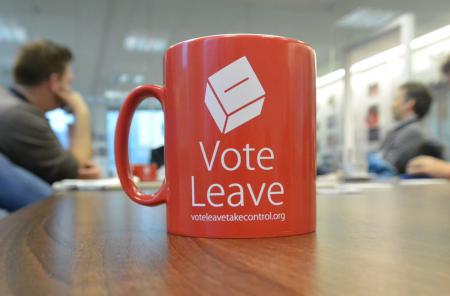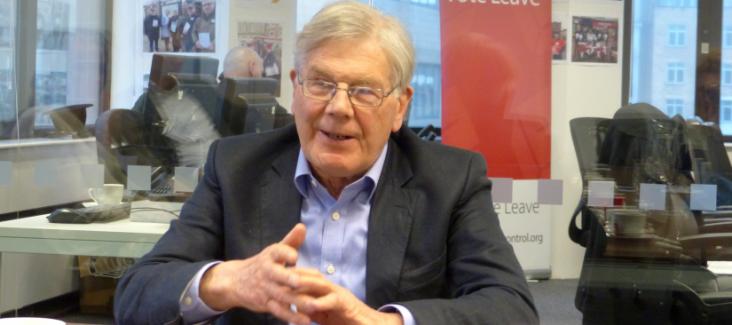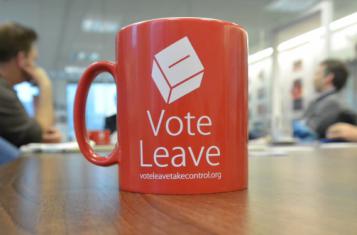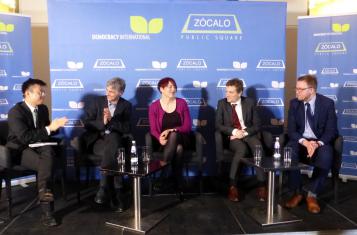Democracy International: On 13 April 2016 the Electoral Commission decided to appoint Vote Leave to lead the No-campaign ahead of the popular vote on Britain’s EU membership on 23 June. How do you feel about this decision?
Nigel Smith: I am personally pleased because Vote Leave is the campaign I had already chosen to support. In my view, Vote Leave will present the broadest range of arguments to British people. You know, in any referendum the debate is very important, it is almost as important as the vote itself. It makes the whole exercise worth doing. There was a great risk that the debate was only going to be about migration, but Vote Leave will make sure that this will be one of the issues of the debate but not the only one.
Which argument will Vote Leave use at most to convince British people to vote against EU membership?
The biggest argument will be to ‘take back control’ (sovereignty) in areas such as fishing, farming, industry and migration. That will be the number one argument, I have no doubt. You know, subsidiarity is a crucial idea of the EU, which means that powers should be as close to the people as possible. Instead EU subsidiarity has been a dead letter. Centralising power in Brussels has gone too far for people like me.
For years, you have been a critical proponent of a British European Union membership. Now you have changed your mind. For what reasons?
For me the big issue was the Euro, which of course goes back almost twenty years. You cannot have an effective Euro in a freely associated European Union. To make the Euro work, you need a European finance minister and common EU budgetary powers. This will effectively complete the Euro in the next few years and it will make the Eurozone more politically centralised.
Although the UK does not have the Euro, the UK cannot escape this process of integration. The fact that the EU was not ready to consider a looser arrangement for countries that did not want to be centralised has finally flipped me against the EU. I finally accepted that the EU cannot be reformed.
How should the European Union look like for you to support it?
The most important thing is that I do not want something like a United States of Europe, a supranational state. I would like to see a strong France, a strong Germany and more inter-governmentalism from strong national parliaments. Also, I propose a strong European Parliament, more democracy in the EU and a freer association overall.
Let’s now go to the referendum campaign Britain is facing ahead of 23 June. Can you reveal a bit about the tactics of the campaign of Vote Leave?
The situation is that the majority of British voters are emotionally out of the EU. But that will not be enough. People are wise enough not just to rely on their emotions. So the Vote Leave Campaign needs to bring forward some practical arguments why getting better control of the economy and farming and all the other powers given to Brussels means a better outcome for voters. If we succeed in making these arguments, then the voters will stick to their emotional views and vote No.
Being the official “lead campaign” means that according to UK referendum law you are entitled to special support. What will you receive from the Government?
We will get a grant of 600,000 British pounds. This is not an awful lot for the whole of Britain, but of course this is better than nothing. Also, we will be able to spend up to 7 million pounds that – by the way – must be donated by UK contributors, and all sources must be publicly declared.
Moreover, Vote Leave will get a free broadcast and the free delivery of a leaflet. However the most important advantage is that the Press and TV will go to Vote Leave first to get arguments and contributors. Actually, the BBC is doing quite well in covering a balanced debate so far.

Who will be your biggest opponent in the campaign?
One rival of course is “Britain Stronger in Europe”, the designated Remain-campaign. But the real opponent is the British government. They are taking a very big, influential role in the campaign. Just this week they spent 9 million British pounds on a ‘neutral’ leaflet sent to all households.
So in fact they spent more money on one single brochure than we are allowed to spend overall. The Prime Minister is very active in the campaign. Also one must notice that the Government is backed by the civil service. In Downing Street now you will find an office with 25 highly intelligent people working for a Yes vote in the referendum. This is a misuse of taxpayers’ money.
But is not the Government divided on the referendum, meaning some ministers support a Yes vote, while others advocate a No?
Yes, this is exactly right. But this is a reason why the Government as a Government, should stay out of the referendum. Ministers should not act in their role as representatives of the Government, but they should act as individuals in their private capacities.
Actually, the body that had set up the Referendum law had proposed that government should only campaign as individual members for whichever side they support. This law has been in effect for 16 years, but this is the first time the Government is taking such an active role. All this makes it very hard to have a fair referendum debate.
When does a campaign become “dirty”, when does it get beyond moral standards for you?
For me it becomes dirty when the campaign starts to play tricks on individuals. There have been two instances where two people of the Leave Campaign have been attacked as individuals and not in their role as policy campaigners. Moreover, we must critically reflect on the Prime Minister’s role. It is not okay when he uses the power of his office to coerce organisations in support of one side. That’s all not good for real direct democracy.
In case, “Vote leave“ succeeds and most British citizens will vote to leave the EU. What will happen to the United Kingdom next?
I hope that both EU and the UK pause and reflect rather than start a war of words. This is the first thing that must happen. And then in due course they will have to start the negotiating procedure according to the EU Treaties. At the end of the period, the UK will ‘nationalise’ the EU acquis, allowing a seamless transition. They will have to integrate the necessary parts into British law. But before all this happens, both sides should really carefully take stock and to reflect on why there was the No-vote and learn from the consequences.
What will be the repercussions of the No-vote to the whole EU?
It is going to be difficult. Britain is the third largest economy in the EU and contributes about 14 per cent to the EU budget. So the EU budget would have to change and the voting power also. A Leave-Vote will be a big deal for Europe. This is also why politicians should take stock after the vote and behave with a lot of maturity with regards to what follows next.
The EU referendum on 23 June is only the third popular vote on a substantive issue in modern history at the UK-level. Do you think that soon there will be more such referendum votes coming up?
Without doubt there will be more referendums, but I fear that this referendum will cause a rethink of the law because of the Government’s hyperactive role this time. Referendums are instruments of direct democracy. But if it seems to be an instrument of Government, this will have a negative impact. Referendums must not be used by the Government to rubber-stamp decisions. We must follow the example of the Irish or Swiss and go for a more neutral role for Government in referendums.

My final question: What’s your bet? Will the Queen still be an EU citizen after 23 June?
This is a funny, fascinating question. Can the Queen be a citizen of her own country or is she the boss of her own country? You could have a long legal argument about this. As the sovereign, do you just share your sovereignty or has she given it away? Actually, I do not know if the Queen is a citizen of her own country. I must ask a royal about this.
In general, the Queen is on a royal tightrope. She has to balance both sides of the debate. And with regards to what you are hinting at with your question, I think the result will be very close. I am not sure if there will be a Leave Vote in the end and the Queen accordingly would not be an EU citizen anymore. We need to wait and see what is going to happen and of course campaign in the meantime.
Nigel, many thanks for your time.
Interview by Cora Pfafferott, 14 April 2016






